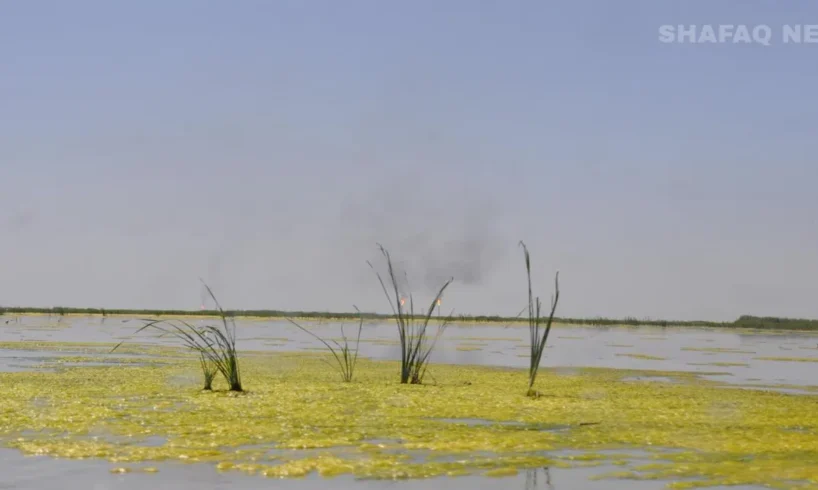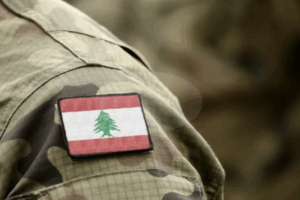
2025-11-21T19:42:38+00:00
font
Enable Reading Mode
A-
A
A+
Shafaq News – Maysan
The memory of Hawizeh’s blue water still lingers, the light
once shimmering on its algae before drought forced Mustafa Hashem and his
family to leave. He remembers the scene vividly, a landscape that has since
dried into cracked earth.
Born in 2002 in a village bordering the marsh, he grew up
hearing stories about the earlier life deep inside its waters, a place where
residents were banned from living since displacement campaigns in the 1980s and
1990s. The restrictions, he says, have remained in place.
Mustafa, now an environmental and human-rights activist from
a family of eight, told Shafaq News that he spent much of his childhood in a
small wooden boat known locally as a balam, often staying overnight with his
father in an area called Barakat Umm al-Naa’ej, surrounded by dense reed
forests.
“In every trip we would tie the boat in the middle of the
marsh and sleep,” he said, adding that “The sky full of stars, the breeze, the
sound of birds—I remember it clearly. It was something magical.”
Before the marsh dried up, he worked with his father as a
fisherman. They would leave at dawn and return with enough to sustain their
family. When the water vanished, the landscape turned into dry land.
Hawizeh Marsh, covering roughly 1,377 square kilometers, is
one of the most prominent wetlands in southern Iraq, fed by rainfall, seasonal
floods, and branches of the Tigris River. Once rich in water and wildlife, it
now suffers from desertification and the loss of biodiversity amid prolonged
water shortages and a long history of neglect that has pushed residents to
migrate or adapt to harsh conditions.
Read more:Drought threatens Iraq’s food and social security, lawmaker warns
Mustafa later took a job in an oil field for about 20,000
dinars a day (Approx. $15.3), then moved to work at a power station after he was dismissed.
“I still live with my family in the marshlands along the
riverbanks,” he said, noting, “But our original home in Hawizeh Marsh has
become just a memory after drought consumed it.”
As someone from a culture built around water, he said, watching the marshlands decline felt like witnessing “a people die slowly each
time they are deprived of their water.”
Mustafa pointed to arrests, mistreatment, and even deaths
that residents of the area have faced. “I grew up in my own country as a
second-class citizen,” he noted. “So did my father, my family, and everyone I
know.”
He believes climate change has become a justification used
by authorities to explain failures in securing Iraq’s water share. “We have no
share of the Tigris and Euphrates—neither from Turkiye, which holds back the
water, nor from Iran, which diverts it, nor from our own government, which
leaves us to the drought and gives our lands to oil companies,” he added.
Read more: Green turning grey: Inside Iraq’s accelerating desertification
According to Mustafa, conditions changed sharply after 2022.
The marsh, he said, is now surrounded by a security barrier, and entry requires
a special permit renewed every six months or a year. “We, the original
inhabitants, must hand over our IDs at the entrance and receive a badge marked
‘marsh fisherman,’ and we have to leave before 4 p.m.” Women, he added, are
banned from entering entirely, while men face strict searches. Even bundles of
reeds must be unloaded for inspection. “The procedures grow more complicated
every year.”
For Mustafa, the marsh is more than a place. “It is spirit
and identity, and that is why we call what is happening today domination over
our land.”
He once owned a herd of twenty water buffalo. “I used to
speak to them as if they were people, because we had a bond of years,” he told
us, remembering the first buffalo that died after sinking into the mud.
Today, only about ten animals remain after deaths and sales.
“Each one that left had a story,” he noted, adding that “One died of thirst,
another from illness, and the rest we sold because there was no water or
fodder. Every sale was painful, as if we were saying goodbye to one of our
own.”
Written and edited by Shafaq News staff.





